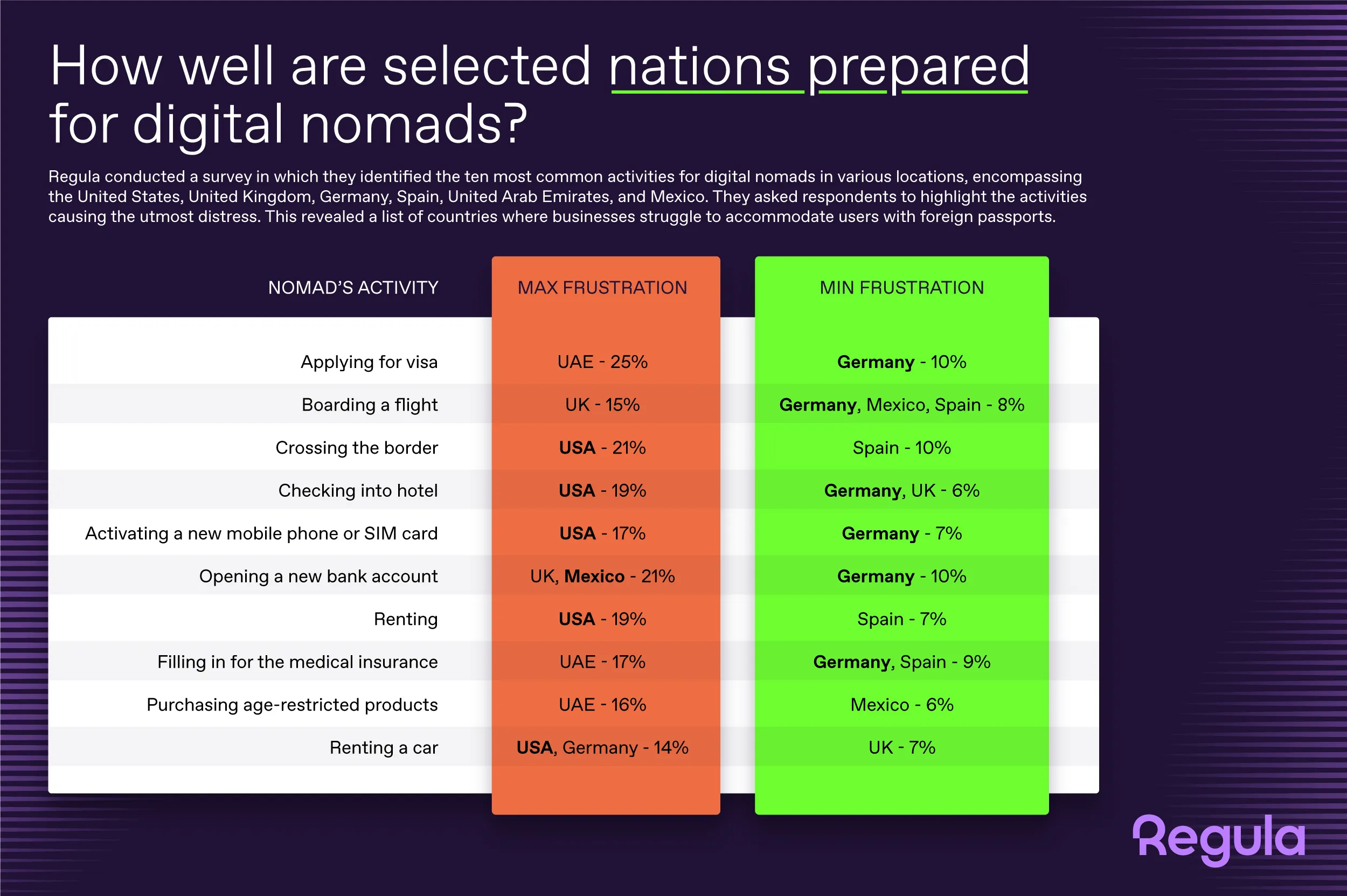Regula Survey Reveals Countries Less Equipped for Digital Nomads
Regula, a global developer of forensic devices and identity verification solutions, conducted a survey on the user journey of digital nomads – professionals on the move. The results revealed nations where the initial interaction with organizations, particularly the verification process, is most frustrating. Remarkably, the United States stands out as the place where holders of foreign passports encounter the most challenging verification processes when compared to their counterparts in other countries.
When investigating digital nomads' journey as new clients, Regula compiled a list of the ten most common activities in various locations spanning the United States, United Kingdom, Germany, Spain, United Arab Emirates, and Mexico. They then called upon respondents to pinpoint the activities causing the utmost distress. Through this approach, the survey brought to light a comparative ranking of countries where businesses encounter difficulties in accommodating users who possess foreign identity documents.
Interestingly, nomads are expressing the most frustration when interacting with organizations offering services in the United States. This revelation comes as a surprise, given that the United States was the most frequented destination for the digital nomad community in 2022.
The most painful verification processes for nomads in the USA are linked to specific stages: crossing the border (21 percent of respondents), checking into a hotel (19 percent), renting accommodations (19 percent), activating a new mobile phone or SIM card (17 percent), and securing a rental car (14 percent).
In the second spot, the United Arab Emirates presents its share of hurdles, particularly in the areas of applying for a visa, navigating the intricacies of medical insurance, and procuring age-restricted products.
On the other end of the spectrum, standing out as a prime example of efficiency for foreigners, is Germany. It boasts a majority of seamless verification processes during critical steps, including applying for a visa, boarding a flight, checking into a hotel, activating a new mobile phone or SIM card, opening a bank account, and completing medical insurance paperwork.

How well are selected nations prepared for digital nomads?
It also needs to be highlighted that identity verification use cases vary depending on the country, shaped by the specific nuances of local migration laws. For instance, digital nomads in the UAE and US tend to apply for work permits more frequently than their counterparts elsewhere.
Race against time
Just imagine the bureaucratic labyrinth of numerous registrations, verifications, and account openings with essential organizations in a new location that must be navigated by nomads within just a few weeks or a month.
The most prevalent issue associated with the verification process, cited by 19 percent of the survey's respondents, revolves around document validity periods. Some identification documents come with expiration dates, and for a digital nomad who is far from their home country, renewing these documents on time can pose significant challenges.
The challenge of providing proof of residency is cited by another 19 percent of respondents. Digital nomads often lack a fixed residential address, making it hard to furnish traditional proof-of-residency documents like utility bills or rental agreements.
Linked to the previous point, 18 percent of respondents highlighted the challenge of frequently changing locations. Constant travel and shifts in location can result in inconsistencies in the information provided during ID verification, potentially causing delays or rejections. Lastly, trust and credibility are a top concern for another 18 percent of nomads. They may encounter skepticism or a lack of trust from institutions due to the unconventional nature of their lifestyle and work arrangements.

Verification poses a daunting task for digital nomads as each country and business enforces its unique rules, often lacking streamlined processes for foreign document verification. In the era of global mobility, businesses and nations cannot ignore this new breed of customers and need to carefully review their users’ journeys to elevate the standards of identity verification processes, making them both simple and secure.
— Henry Patishman, Executive Vice President of Identity Verification Solutions at Regula
*The research was initiated by Regula and conducted by Sapio Research in September 2023 using an online survey of digital nomads and Fraud Prevention decision makers across the Software/Tech, Financial and Banking Services, Technology, Telecoms, Travel and Hospitality sectors, and others. The respondent geography included the US, UK, Germany, Spain, UAE, and Mexico.